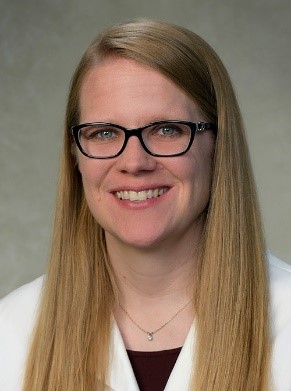
Trial Results: Recent ECOG-ACRIN research
March 3, 2021
COVID-19 and clinical trials: Continuing care in a pandemic
March 3, 2021Now Enrolling: Clinical trial EA2174 is evaluating a new treatment approach for patients with esophagus cancer

Although esophagus cancer is relatively rare, it is one of the top ten leading causes of cancer-related death in men and one of the top twenty in women. Survival rates for patients are generally low—even for those with disease that has not spread beyond the esophagus (localized disease). The esophagus is the muscular tube that connects the back of the throat with the stomach.
The usual treatment for patients with localized esophagus cancer is chemotherapy and radiation therapy for a total of 5 - 6 weeks, followed by surgery to remove the cancer. Unfortunately, cancer returns in approximately 85% of patients.The EA2174 clinical trial, led by Jennifer Eads, MD (University of Pennsylvania), is testing if the addition of immunotherapy to the usual treatment will lead to better results for patients. Immunotherapy refers to a type of cancer treatment that helps a patient’s immune system fight their cancer.
There are two parts to this study: before surgery and after surgery. Before surgery, patients will receive either the usual treatment (chemotherapy and radiation) or the usual treatment plus an immunotherapy drug called nivolumab. The main goal for this part of the study is to assess the effects of adding nivolumab to the usual treatment; researchers hope this new approach will reduce or eliminate the amount of cancer found in tissue samples removed during surgery.

“Several other trials have demonstrated a role for immunotherapy in the management of advanced esophageal cancer,” said Dr. Eads, pictured. “Recently, nivolumab given after surgery was shown to be effective for patients who had chemotherapy and radiation before surgery; in the EA2174 trial, we look to build on this by evaluating the role of nivolumab before surgery.”
After completing the treatment described above, all patients in the study will have surgery to remove their cancer.
When surgery is over, all patients in the trial will undergo additional treatment. Some will receive nivolumab alone. Some will receive nivolumab and ipilimumab, a different immunotherapy drug. The main goal for this part of the study (after surgery) is to discover if disease-free survival is improved with the use of combination nivolumab and ipilimumab as opposed to nivolumab alone. Disease-free survival refers to the length of time after treatment ends that a patient survives without any signs or symptoms of cancer.
Patients may qualify for this study if they have localized or locally advanced esophagus or gastroesophagus cancer and are eligible for surgery. They must be at least 18 years of age, and must not have received any prior chemotherapy or radiation therapy for their cancer. They also must not have received prior immunotherapy.
Learn more about the EA2174 study at ecog-acrin.org.

